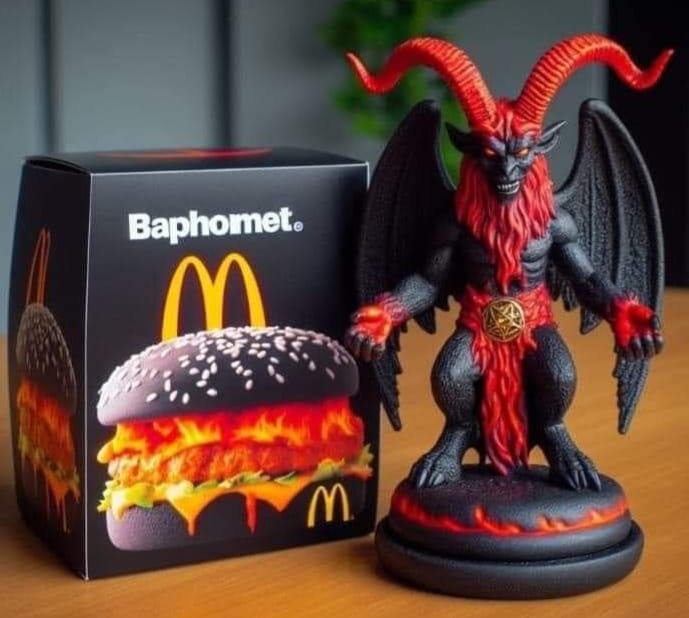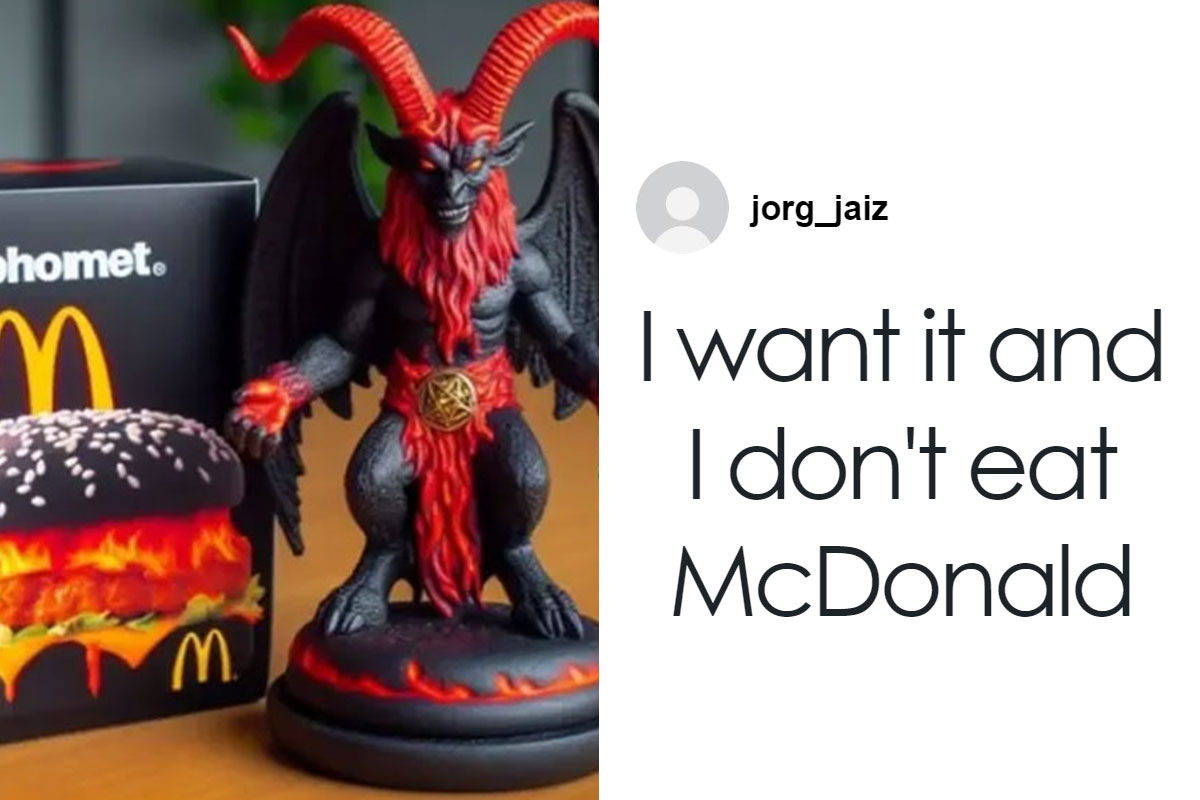Have you seen the unsettling images circulating online of a supposed "Baphomet Happy Meal"? Rest assured, the disturbing visuals of a satanic-themed McDonald's meal are nothing more than a digital fabrication.
The internet, a realm of boundless information, also serves as a breeding ground for misinformation. Recently, a particularly provocative image has ignited a flurry of speculation: a "Baphomet Happy Meal." This alleged offering from McDonald's depicts a sinister-looking meal, complete with a black burger, a demonic figurine, and packaging adorned with the word "Baphomet." Social media platforms like X (formerly Twitter), TikTok, and Instagram have become the primary channels for the image's dissemination, sparking debate, fear, and even calls for boycotts. But is there any truth to this viral claim? The short answer: absolutely not.
McDonald's itself has unequivocally refuted the validity of these images. Fact-checking organizations, including Snopes, have thoroughly investigated the matter and concluded that the "Baphomet Happy Meal" is a hoax, a product of artificial intelligence. The original image, appearing around March 27, 2024, quickly gained traction online. A video posted on Instagram on April 1, 2024, showcased the image, further fueling the narrative. The visual elements, including the black box with the McDonald's logo and the inscription "Baphomet," have been scrutinized and debunked.
The claim originated from a post on X by user @americareal3 on March 27, 2024. The image was subsequently shared across various platforms, garnering significant attention. The image depicts a "satanic" happy meal, complete with a burger on a black bun, a figurine of the Baphomet, an inverted pentagram, and red horns.
However, the truth behind the viral images is far less sensational. The images are created using artificial intelligence image generators, highlighting how easily manipulated and misleading digital content can be. Content detection tools, such as those offered by "Hive Moderation," confirm the AI-generated nature of the images. The images have been identified as fake. Lighthouse AI Studios has since taken responsibility for creating the images, using the Bing AI Image Generator, and admitted they deleted the original posts to prevent the spread of false information.
The Baphomet, the central figure in the image, is a symbol often associated with Satanism. Its presence in the image added to the shock value, causing people to take the bait. The viral image originated in various languages, with some text in Spanish also circulating, solidifying the reach of the hoax. One common post displays a black burger bun, a toy with red horns, an inverted pentagram, and black wings, accompanied by the word "new."
In fact-checking, the Australian Associated Press (AAP) confirmed that Lighthouse AI Studios made the image using the Bing AI image generator, using the prompt "Baphomet happy meal." The team then deleted the post to prevent the spread of fake news. These facts prove that, the "Baphomet Happy Meal" is an example of the rapid creation of fake content enabled by AI and the importance of verifying the information encountered online.
Several telltale signs point to the image's artificial origins. The Happy Meal boxes, for example, typically feature a handle on top, a detail missing from the fabricated image. The arches on the sides of the box also appeared misshapen, and the "M" in the "Baphomet" text appeared distorted, revealing the characteristics of images created through AI. The speed with which the image spread showcases the need for users to be cautious about the content they consume.
The rise of AI-generated content raises serious questions about the reliability of information in the digital age. While AI tools offer exciting creative possibilities, they also present the potential for malicious actors to create and disseminate misleading visuals. Therefore, staying vigilant and relying on reputable sources for information is critical. It is essential to view any questionable online content with a critical eye and avoid sharing information that has not been independently verified.
The "Baphomet Happy Meal" is a perfect example of how easily people can be misled and the importance of fact-checking. The next time you encounter an unusual image online, take a moment to assess its authenticity, seeking information from trusted sources and verifying claims before you share them. The ability to critically evaluate information has become more essential than ever in an environment filled with AI-generated content.
| Aspect | Details |
|---|---|
| Origin | AI-generated image, originating on X (formerly Twitter) around March 27, 2024. |
| Content | Depicts a McDonald's Happy Meal with satanic themes, including a black burger, Baphomet figurine, inverted pentagram, and red horns. |
| Platforms | Spread across X (formerly Twitter), TikTok, Instagram, and other social media platforms. |
| Verification | Verified as fake by McDonald's, Snopes, and other fact-checking organizations. |
| AI Tool | Created using an artificial intelligence image generator, specifically Bing AI Image Generator. |
| Creators | Lighthouse AI Studios (acknowledged creating the image). |
| Motivation | Likely created as a humorous or provocative image, but quickly went viral due to the sensational subject matter. |
| Indicators of Fake | Misshapen McDonald's logo elements, absence of typical Happy Meal box handle, and content detection scans showing AI generation. |
| Consequences | Spread misinformation, sparked debate and calls for boycotts. |
| Lessons Learned | Importance of media literacy, fact-checking, and the need for critical evaluation of online content. |
This incident serves as a potent reminder of the ongoing battle for truth in the digital age. With ever-improving AI technology, distinguishing between reality and illusion online requires increased vigilance. The "Baphomet Happy Meal" is a cautionary tale, but also a lesson on the importance of remaining skeptical and seeking out reliable information.


